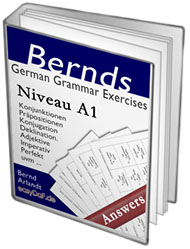Learning German Grammar – TENSES The Perfect Tense
The Perfect tense is a very important tense in German grammar. We use it almost always, when speaking about the past. On this page, I shall explain to you how to construct the Perfect tense and when to use it. I shall show you the whole thing first using the example sentence „Ich lerne Deutsch“ (I learn German).
The rule for creating the Perfect tense is as follows:

„Auxiliary verb“ („Hilfsverb“) here means that at position 2 in the main clause (where the conjugated verb is ALWAYS found) there is a verb that helps us to construct the perfect tense in German grammar. The auxiliary verb does not have any meaning by itself, it has only a grammatical function.
Because of this, there are fundamentally only two possible verbs that one can use as the auxiliary verb for constructing the Perfect Tense, namely the verb „haben“ and the verb „sein“. Let me explain to you when to use „haben“ and when to use „sein“.
Firstly, an example:
Present tense: I learn German/ I am learning German.
When we want to put this easy sentence into the Perfect tense, the following happens:
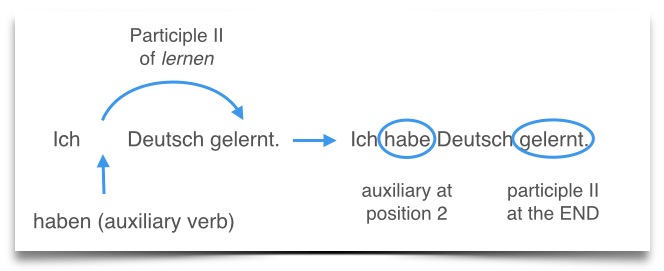
What happens?
The verb „lernen“ becomes the past participle and moves from position 2 to the END of the sentence. To Position 2 now comes the auxiliary verb „haben“ in conjugated form, so „Ich habE“, with an „e“.
This structure always remains the same: auxiliary verb in Position 2, past participle at the end of the sentence, as with much longer sentences:

When do we use the auxiliary verb „sein“?
The answer to this question is, at first glance, quite simple:
Rule:
Verbs about Movement and Change of state use the verb „sein“. And how can we best remember this? Very simple! Be creative and write the verb „sein“ in such a way that you could associate with movement! I am sure, that there are many creative people out there who can do that pretty well. I myself have always thought of this picture here:
And what does this mean exactly?
Here are some examples of Verbs of Movement: to go „gehen“, to travel „fahren“, to run „rennen“, to fly „fliegen“ and so on. If we construct the Perfect tense with these verbs, thus we have to use the auxiliary verb „sein“ in conjugated form in Position 2 and, again, the corresponding Past Participle at the END of the sentence:
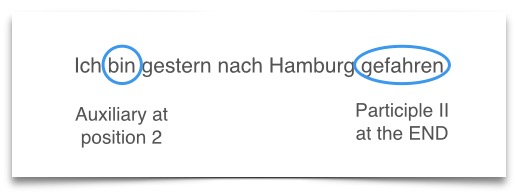
What are Verbs of Change of State?
Verbs of Change of State express when a subject’s state changes from ‚State A‘ to ‚State B‘! Here are a few examples (all sentences in the table are in the present tense):
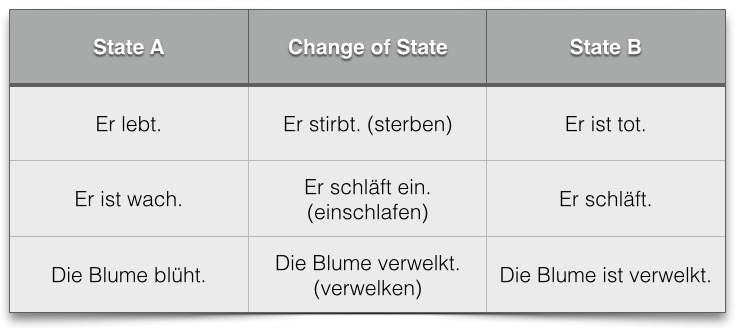
And here once more an overview in the form of a table
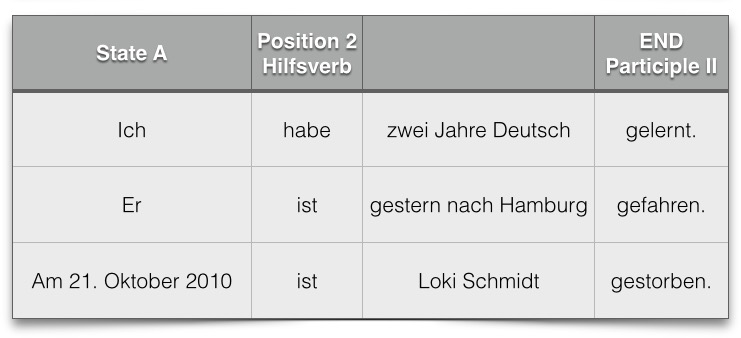
So far so good. In my experience, however, German students now find it difficult to tell whether they are dealing with verbs of Movement or of Change of State.
Furthermore, there are some verbs that you really can’t say whether they are Verbs of Movement or not, for example with the verb „spielen“. Most people associate that verb with movement, and in spite of this, when constructing the Perfect tense with this verb you use „haben“.
In addition, there are often regional differences. In Austria, some verbs take a different Auxiliary Verb when constructing the Perfect Tense to Germany. So there is always lots for German Students to be confused by!
For this reason, I describe in my eBook „Learn German Grammar with Mnemonics“ special learning techniques, that make it easier for you to tell which verbs in the Perfect tense use the auxiliary verb „sein“.
When do you use the Perfect Tense?
Firstly you must remember, that the Perfect tense conveys the meaning of the past in exactly the same way as the Imperfect tense (Präteritum). There is no difference! It does not matter; both of the following sentences mean exactly the same thing:
65 million years ago, the Dinosaurs died out…
Vor 65 Millionen Jahren sind die Dino Saurier ausgestorben. (Perfekt)
Vor 65 Millionen Jahren starben die Dino Saurier aus. (Präteritum)
The statements made with both grammatical times/tenses mean exactly the same. The difference is only in the communicative context of the sentence.
We have to distinguish between a formal, public, literary context and a more easy informal context.
Generally the rule is that you use the Imperfect tense in a formal context, for example in literature written in a serious tone such as Newspapers, scientific work or in a serious public speech.
If it is meant to be received in a more casual manner, we use the Perfect tense. When we email our friends, for example, or in normal everyday speech and so on.
Now you also understand why the Perfect tense is so important in German grammar. If we are talking „ganz normal“ in everyday life and we speak about the past, we use the Perfect tense. So it is very important that you can use it properly.
Exceptions
For the verbs „sein“, „haben“ and the Modal verbs (wollen, müssen, können usw.), as a general rule, the Germans do not use the Perfect Tense. You can speculate about why this is – I guess it simply sounds a little awkward or old-fashioned. Because of this, more often we use the Imperfect tense (das Präteritum); with these verbs it is simply easier. Here are a few examples to clarify the difference:
sein
Silvester 2001 bin ich in Rom gewesen. (perfect tense)
Silvester 2001 war ich in Rom. (past tense)
werden
Vor einigen Jahren bin ich Deutschlehrer geworden. (perfect tense)
Vor einigen Jahren wurde ich Deutschlehrer. (past tense)
bleiben
Gestern bin ich noch ein bisschen länger auf der Party geblieben. (perfect tense)
Gestern blieb ich noch ein bisschen länger auf der Party. (past tense)
haben
Noch vor einem Jahr hat Paul einen guten Job gehabt. (perfect tense)
Noch vor einem Jahr hatte Paul einen guten Job. (past tense)
Modal verbs
Als Kind habe ich Pilot werden wollen. (perfect tense)
Als Kind wollte ich Pilot werden. (past tense)
Learning aids for German grammar
If you really want to learn German grammar, I would like to recommend you to use creative learning aids for German as a foreign language. In my FREE Video-Course "German Grammar for your Brain".





